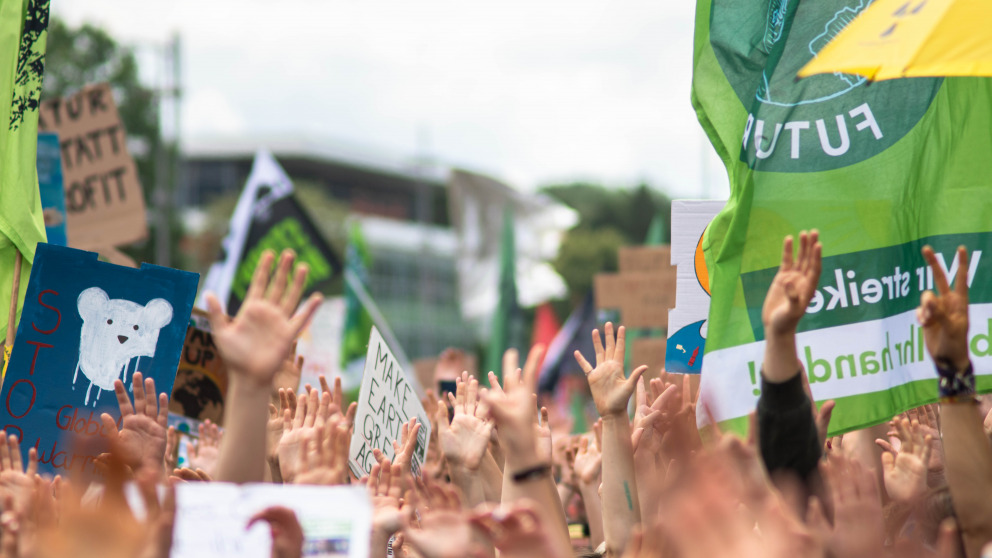Diversity Isn't Something That Just Happens
05.10.2021

They advocate climate protection, criticise daily experiences of racism, and work toward fairer structures in world trade: The scope of German NGOs is highly diverse. But their personnel are not: They are mostly made up of white academics. It is time for this to change.
Isadora Cardoso Vasconcelos and Merle Groneweg
“Too young, too white, too academic” is what the German newspaper Taz said of the German climate justice movement in the winter of 2019. The article was referring to a study on Fridays for Future carried out by the Institute for the Study of Protest and Social Movements in Berlin: Only about 17 per cent of the respondents said that they or at least one of their parents was born abroad, much less than the round about 25 per cent of the general population in Germany with migrant or post migrant experiences.
Around the time the study was published, events began increasingly addressing how the climate crisis, racism, and colonialism are linked; some of them were organised by Black Earth Kollektiv in Berlin. In the summer of 2020, the Black Lives Matter mobilisation set off the biggest anti-racist and anti-colonial protests that Germany had ever seen. Since then, activists have been speaking of a “window of opportunities” for achieving greater social change.
While debates on white dominance, racism, and exclusive structures in society and the climate justice movement are gaining momentum, Germany’s NGOs are not following suit.
Professionalised NGO structures are even more exclusive and dominated by white people than the climate justice movement. The staff pictures of these German development, environmental, and human rights NGOs mostly, if not exclusively, display photos of white individuals. And names that point to possible (post) migrant experiences are rare.
In July 2020, the German branch of the climate organisation 350.org was one of the few NGOs in Germany to explicitly take a stand on this. A post on their website states: “The German climate movement is mostly white. Almost all well-known environmental organisations (we at 350 Germany are no exception) are directed by white individuals, have overwhelmingly white personnel and pay too little attention to other voices.”
That being said, at least some positive change has recently occurred at Venro, the umbrella organisation of development NGOs in Germany, where certain members have begun creating a BIPoC (Black, Indigenous and People of Colour) network.
Lack of diversity is a structural problem
Given the level of debates around representation and diversity, which at times derail into individualised blaming – the opposite of what we hope to achieve – we stress that the question of people occupying or lacking equal opportunities to occupy positions is a structural problem and thus needs to be addressed structurally.
Paid NGO jobs are popular among young university graduates and other applicants – despite precarious working conditions which often mean a lot of overtime, fixed contracts, and low wages. Some hope to find a secure job, others a fulfilling activity.
A paid position at an NGO, despite all the complexities that come with the challenges of reformist co-optation and turning political work into a “job”, is a paid position, and one of relative privilege and power. It lends legitimacy in circles that the radical left and environmental movement groups often cannot or do not want to enter, such as the institutionalised realm of politics. This realm is, by definition, highly exclusive, and – as all of society – hierarchically structured according to the intersecting divisions of class, race, gender, origin, etc. NGOs reproduce these structures by recruiting members of their “own” networks. These are often people who share their status, people they personally know or have heard of that seem “suitable” (they appear with a certain habitus and have networks that seem “useful” or “influential”).
To tackle these structural challenges, far more than just reflecting on privileges is necessary. Development NGOs in Germany should include people from what they call their “target groups” in their projects or grant requests. These “groups” – farmers, women, LGBTQIA+, migrants, and others – are the real experts on the topics NGO projects deal with. They should be the ones playing a major role in their projects or interventions.
Reducing biases
Those responsible for job postings must actively seek a broad spectrum of applicants. To do so, they might post job ads in the online and offline spaces of BIPoC in Germany. Also, job postings should explicitly promote applications from those who identify as migrants, BIPoC, queer, and people with disabilities.
Postings should also be translated into English and any other relevant languages. This would encourage individuals to apply whose first language is not German. Moreover, the recruitment process should be less based on academic or work-related achievements and more on life experience like unpaid work, care, and activism.
Screening processes that do not include personal data can reduce biases. Applicants can then talk about certain identity positions, their own experiences of discrimination, or other relevant experiences that have influenced who they are today – or not, if they choose not to.
NGOs have the means – or can apply for them – to begin a transformation from the outside, to invite anti-discrimination and anti-bias experts and to fundamentally change their own recruitment and work procedures.
Yet even these steps are only the beginning of a long-term process of change. This process will require commitment and patience – as well as the readiness to make mistakes and then call attention to them, as well as to both acknowledge and forgive them.
The German version of this article first appeared on 13 September 2021 in klimareporter.